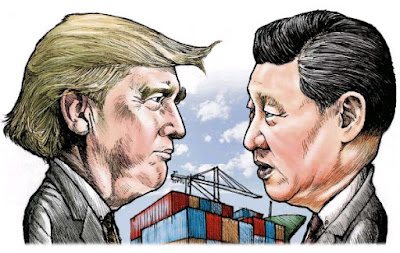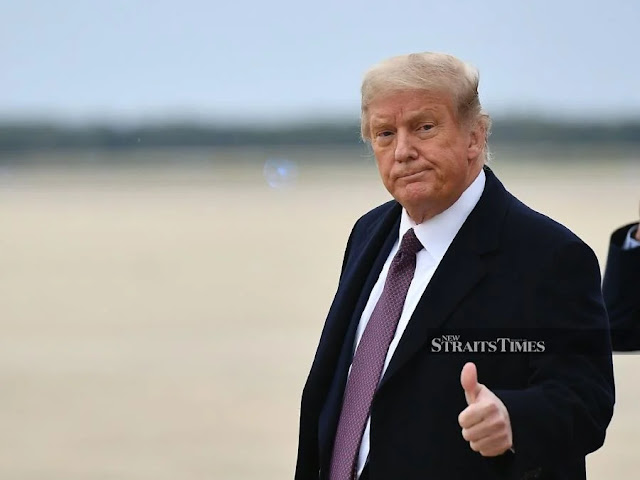A look back at Trump’s four years
https://youtu.be/2BdEO3hKt60

With the new President in the White House, the time to embrace the global community is now and not delay any longer. Washington will then be looked upon with great respect after four years of rule by one man, which was nothing but traumatic, chaotic and deceitful.( Pic shows Biden signing executive orders on first day of Presidency.)
AS we now welcome the era of Bidenomics over the next four years, one cannot help but to review the impact of the previous US president’s tenure which ended just three days ago.
One of Trump’s rallying cry was his call of making America great again. With that, the US embarked on a trade war with the rest of the world, in particular with China, to reduce the massive trade deficits that the US has been experiencing for umpteen years.
In addition, Trump also wanted to bring foreign manufacturers to the US on the assumption that this would reduce their import bill, attracting foreign direct investments as well as creating jobs for Americans.
The trade war saw US imposing tariffs on Chinese goods, and in retaliation, China too started to impose tariffs on US goods – effectively a tit-for-tat move by the two superpowers where effectively nobody wins.
The US-China trade war led to nervousness in markets, in particular during the 2018-2019 period, but the impact of the stand-off tapered off sometime about a year ago when both agreed to enter into the Phase 1 trade deal.
To recap, that trade truce entailed China agreeing to increase the import of American goods and services by at least US$200bil over the next two years. China, which purchased some US$130bil in total goods and US$56bil in services in 2017, was supposed to increase total imports by about US$162bil in total goods purchased and US$38bil in services over the two-year period.
In terms of breakdown for the year 2020 and 2021, China was to increase its imported goods by US$64bil in 2020 and US$98bil this year from the base line figure of 2017. In terms of services, the level of imports by China was expected to increase by about US$13bil last year and US$25bil this year.
Since the Phase 1 trade deal was inked about a year ago, how has the Chinese trade with the rest of the world and in particular the US performed in 2020? Overall, with the December 2020 trade data just released last week, China saw its total exports for the year rising by 3.6% while imports fell by 1.1% year-on-year (y-o-y).
This, of course, would lead to one thing – a widening trade surplus. In fact, China’s 2020 total trade surplus jumped by 27% to US$535bil – the highest in five years.
How about China’s trade with the US? Based on the data released, China’s trade surplus with the US rose by 7.1% to US$316.9bil and contrary to what president Trump intended to achieve with his tariff measures. Chinese exports to the US in 2020 increased by 7.9% to US$451.8bil while imports surged 9.8% y-o-y to US$134.9bil.
This definitely fell short of the targeted US$194bil total goods that was supposed to be imported by China in 2020 (US$130bil base line + US$64bil target). In terms of percentage, the shortfall was as much as 30%.
Based on the data from the US, trade with China up to November 2020 showed that US exports to China totalled some US$110bil while imports stood at US$393.6bil, giving rise to a trade deficit of US$283.6bil.
It is likely that for the month of December 2020, the US will add another US$30bil in deficit and thus bringing the 2020 total trade deficit with China to around US$314bil. Total exports for the year will likely come in at about US$125bil, up 15.8% y-o-y; while imports are expected to come in 3% lower at US$439bil.
Compared with the 2018 import value, US imports from China effectively would have dropped by about US$102bil but exports to China have increased by just 2.5% from the 2018 level of US$122bil.
In essence, while the US bought 19% less goods from China, what it sold to Beijing was barely any higher. In addition, while the US trade deficit with China may have improved by about US$30bil y-o-y in 2020, the Chinese trade surplus with the rest of the world is significantly higher.
What does this mean for Phase 1 Trade Deal?
With a shortfall of some US$70bil (based on US data) in 2020 and on the assumption that China is to import an additional amount of US$98bil this year to meet the target of Phase 1 trade deal, China would need to import as much as US$298bil worth of goods from the US this year!
This is derived after taking into consideration the base line of US$130bil in 2017, adding the US$70bil shortfall in 2020 and topping it up with the pledged US$98bil increase. Indeed, it is highly unlikely that China would be able to meet this target, which is more than doubled what it imported from the US last year.
Effectively, Phase 1 trade deal is dead in the water. Trump’s strategy can be said to have failed and China in effect has emerged as a clear winner in the trade war. What is now left to be seen is what will Bidenomics bring to the table as far as the trade war is concerned.
Will the new President soften his approach towards China? Will it be status quo or will Biden continue with Trump’s hard approach in dealing with China? After all, Janet Yellen, the treasury secretary nominee was quoted as saying that the US is prepared to take on China’s “abusive” trade and economic practices.
However, in the interest of globalisation and ease of movement of goods and services, tariffs effectively serve no purpose, especially to consumers as it actually only adds to the cost of goods purchased as the cost of tariff is passed on to the end buyers. Tariff is not a tool to restrict movement of goods or services. Instead, nations should strive to make themselves more competitive.
With the new President in the White House, the time to embrace the global community is now and not delay any longer. Washington will then be looked upon with great respect after four years of rule by one man, which was nothing but traumatic, chaotic and deceitful.
By Pankaj C. Kumar who is a long-time investment analyst. Views expressed here are the writer’s own.
Related posts:
Trapped in US-China trade war when 2 elephantine economices fight ...
US-China trade war escalates, tariff list aims to hinder China’s high-tech development: expert
China hits back after US imposes tariffs worth $34bn
China staunch defender of free trade under WTO, meet the 'selfish giant' of global trade
Did Huawei violate Iran sanctions? No, it shows deeper US-China battle for global influence as power coming from high-tech sector
Minds without borders: A coffee with Huawei Ren: We will be reborn by 2021
China battles US for AI and robotic space: Who’s ahead?









